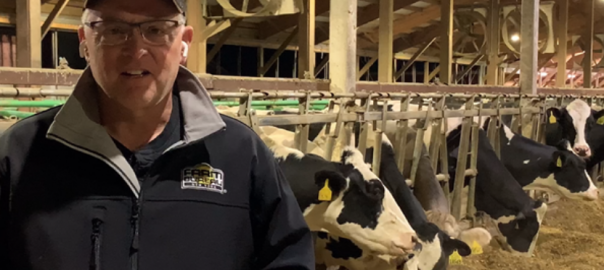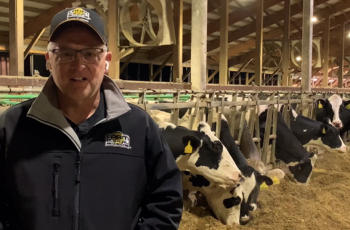
New York Farm Bureau’s State Priorities Strive to Protect What is Essential for NY State

The challenges of 2020 reminded us of many important aspects to our day-to-day lives. These include our food system and how the people who work along the supply chain are essential.
The farming community came together in many ways in the early weeks of the pandemic to mitigate the spread of the virus, protect our employees, adapt to major market disruptions, and provide locally sourced food to all New Yorkers. We must remain vigilant to address ongoing concerns which is why New York Farm Bureau has outlined several priority issues for the current legislative session.
COVID-19 vaccinations are at the top of the list for our grassroots organization. New York Farm Bureau, along with our agricultural partners, are pressing New York State to add farmworkers to the Phase 1-B vaccination rollout as soon as possible. We understand there are logistical and supply issues that need to be addressed, but as we learned last year, we need to do all that we can to make sure our food supply chain functions smoothly and safely. That starts at our farms.
We are asking the Departments of Health and Agriculture and Markets to develop a plan in conjunction with the farming community to establish vaccination locations that provide easy access for farms and their employees. New York Farm Bureau is also taking part in the “Let’s Get Immunized NY” coalition to spread awareness about the safety and efficacy of vaccinations.
The pandemic has also put a lot of pressure on the New York State budget as lawmakers confront a massive deficit. Much of this is dependent on what the federal government may do in terms of additional aid to the states. The governor’s executive budget looks to maintain funding for many agricultural research, marketing, conservation, and animal health programs. They are integral in many ways to the success of our industry. The governor also proposed to continue the workforce retention tax credit at $600 per employee. This helps to address rising labor costs that continue to put our farms at a competitive disadvantage.
It is important to consider that agricultural funding is a tiny fraction of overall state spending, but farms feed all New Yorkers and are an economic engine that returns state investment many times over. Funding reductions for these essential programs would place even larger barriers in front of the state’s food system that would prove more costly to correct down the road.
Nourish NY is another program that we are asking to be fully funded again at $25 million as outlined in Governor Cuomo’s budget. Nourish NY has proven to be a lifeline for people in need as well as for many of our farms. When there were major disruptions along the food supply chain at the beginning of the pandemic, the program stepped in to coordinate a pathway to move food from the farms to food banks, including in New York City. It also compensates farmers for their products and reduces food waste at the same time. It is critical for all New Yorkers that this program continue.
The State of the State placed special emphasis on rural broadband, matching another of our priorities for the year. This is not a new issue for our farms, but again, the pandemic brought to light the sense of urgency that is needed for rural communities to have fast, reliable broadband.
Our farms benefit from strong broadband in many ways, from being able to efficiently conduct business, access market data and use increasingly high-tech equipment. But it is also our farm families that need dependable broadband when they must work and attend school from home. It is also needed to access medical care that is increasingly online. This is an issue of common ground for all New Yorkers.
Another priority for New York Farm Bureau is a renewed focus on science-based decision making at the capitol. This is imperative if we are looking to properly address the impacts of climate change. We are advocating for the Environmental Protection Fund, research and other legislative programs that will include farms in mitigation efforts, carbon sequestration and soil health initiatives. Many of these sustainable practices are already taking place on our farms and further investment will benefit us all. This includes expanding renewable energy.
As we look to a science-based approach to deal with climate change, this attention to science must also be applied to other legislation as well. We have seen bills pass in recent years that attempt to eliminate certain risk management tools, like safe and important pesticides, but the legislation has not taken into consideration the research data and safety protocols that exist. New York is one of the only states in the country that has a separate product registration review process that analyzes pesticides and whether they should be used in New York. Many lawmakers have recently chosen to bypass that process and make these decisions based on politics. The same goes for legislation that ignores veterinarian practices and proven farm protocols to legislate animal care. We all want animals to receive the best of care, to do that we must work with our medical community to make sure good intentions do not harm animal health and safety. Unnecessary regulations only impede food production and increase costs to consumers.
Finally, farm labor needs will continue to be a priority for our organization. New York State and its farming community are national leaders on worker protections, safety programs and human resource training. We must build on that effort while also balancing the needs of our farms to stay in business and employ thousands of farmworkers who want to stay in New York.
In the end, it is imperative that we all work together to expand opportunities and capitalize on what we do well in New York. We have one of the most progressive and diverse agricultural sectors in the country. It is worth maintaining that strong connection to food and farm production, things that are truly essential to each of us.
David Fisher is New York Farm Bureau’s President and a dairy farmer in Madrid, NY.
